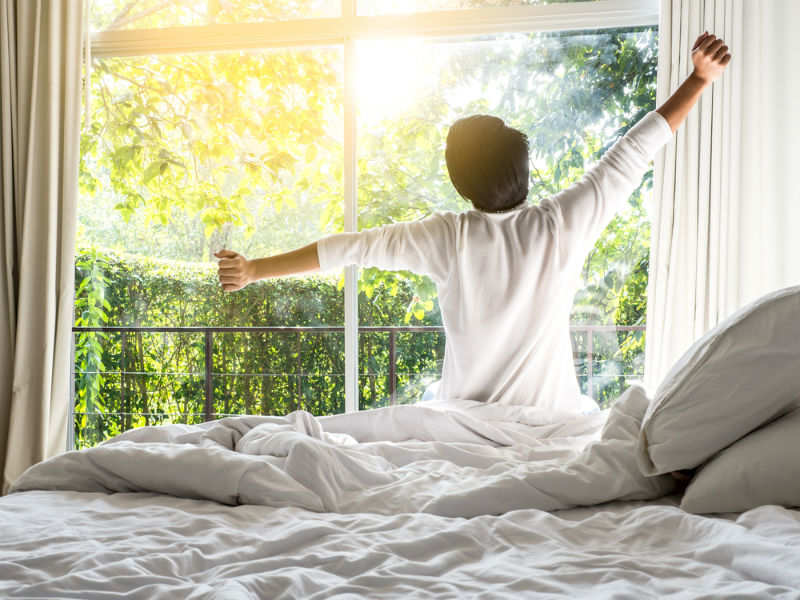
Recent statistics reveal as much as 30% of Americans struggle with sleep deprivation. If you’re struggling with debilitating sleep deprivation, chances are you’ve already noticed some of its harsher side effects, which include symptoms such as impaired memory, slower reaction times, irritability, and extreme fatigue.
Thankfully, sleep deprivation doesn’t have to be a permanent state, and with the right tools and tactics, you’ll find that you’re going to get a good night’s rest a whole lot easier. When you make systematic, sustainable changes to your lifestyle, you’ll find getting a good night’s sleep a whole lot easier.
From getting yourself a weighted blanket to finding a bedtime routine that works for you, here are five ways to deal with sleep deprivation that you’re going to find fail-proof.
#1- Use Sleep Accessories That Are Calming
Weighted blankets are a great way to keep yourself calm as you’re getting ready for a good night’s sleep. If you’ve never come across a weighted blanket before, these nifty sleep accessories have been shown to improve sleep quality and patterns of people who struggle with sleep anxiety and deprivation.
Weighted blankets typically have a glass or synthetic fill that keeps them heavy, and distributes a uniform amount of pressure across the body. The feeling of comfort this sensation provokes is similar to that of being swaddled or embraced. This is known as ‘gentle pressure stimulation’, something weighted blankets are known for.
It’s important to pick a weighted blanket that sits at about 10% of your total body weight. This is because a weighted blanket that is too heavy for you can feel overly suffocating, and create conditions for stuffy sleep, thereby making your problem worse.
#2 – Find A Bedtime Routine That Works For You
One of the key ways you can help yourself get a good night’s sleep is by figuring out a bedtime routine that works for you. Bedtime routines can be a relaxing and simple way to prime your body for a good night’s sleep.
Some popular rituals for calming bedtime routines include drinking a cup of herbal tea before bed, having a warm shower right before sleeping, or even switching out your Netflix habit with some reading instead.
If you’ve found the weighted blanket of your dreams, try spritzing lightly with some essential oils diluted in water for a little aromatherapy before you wind down. Lavender and eucalyptus have both been shown to contain calming properties that can be especially effective on those who struggle to get a good night’s sleep.
The trick to finding a bedtime routine that works for you and actually minimizes your sleep deprivation is by switching things up to see what you’re responding to. Some people find it easy to drift off while listening to a podcast, while others need total silence to get into rest mode.
#3 – Avoid Caffeine After Lunch
Caffeine has the capacity to stay in your system for more than eight hours, and can be a disruptive force in your sleep cycle. If you’re a loyal and true fan of coffee, then giving caffeine up completely might seem impossible. Try weaning off it slowly instead of cutting it out completely, to see what effect it can have on your sleep cycle.
One of the best ways you can see whether your sleep deprivation is coming from your caffeine is by trying to minimize your intake after around noon every day. If you’re finding your sleep cycle significantly improved afterward, the reason you might be experiencing this is that you’re drinking less coffee than you’re used to. If you’re missing the energy boost, try naturally energizing replacements instead, including golden milk, herbal teas, or flavored waters.
#4- Have A Set BedTime & Wake Time

One of the most important determinants of your sleep patterns is ensuring you have a healthy sleep schedule. Working out how you’re going to do this will largely determine whether or not you’re able to get a good night’s rest, and should be one of your first port of calls when trying to resolve your sleep deprivation.
Your body responds best to have a set schedule, so when you force yourself to wake up and go to bed at a set time, your body clock naturally aligns itself with these timings. This can be a great way to ensure you’re getting enough of each stage of your sleep, and is a straightforward way to minimize the chances of sleep deprivation. Try incorporating a specific sleep accessory to help speed the process up, such as a weighted blanket.
#5- Exercising First Thing In The Morning
Consistent exercise can help regulate your sleep cycle, and in turn, minimize the ill-effects of sleep deprivation on your body. Aerobic exercise, in particular, encourages the body to release endorphins, allowing you to gain more energy and focus in general through your day.
Coupling exercising consistently with getting some natural sunlight, and working out as soon as you wake up, can help both with helping you achieve some consistent energy levels through the day, as well as with your body clock, which needs natural day-light to help regulate itself. Most sleep experts recommend working out as a way of improving your sleep cycle.
If you’re struggling with sleep deprivation, it helps to remember you’re not alone. With the right tools, such as a weighted blanket, or the most comfortable mattress you can find for your sleep, you’re going to be able to get a much better night’s sleep.
If you’re trying to get a better night’s sleep, it’s also worth keeping in mind that change doesn’t happen overnight. Try making smaller, sustainable changes to your lifestyle to feel the benefits of a healthy sleep schedule. Whether it’s by rethinking your sleep set-up, getting into a more regular exercise routine, or simply having a bedtime that you stick to come rain or shine, small habit changes can make the most difference when it comes to getting a good night’s sleep.






